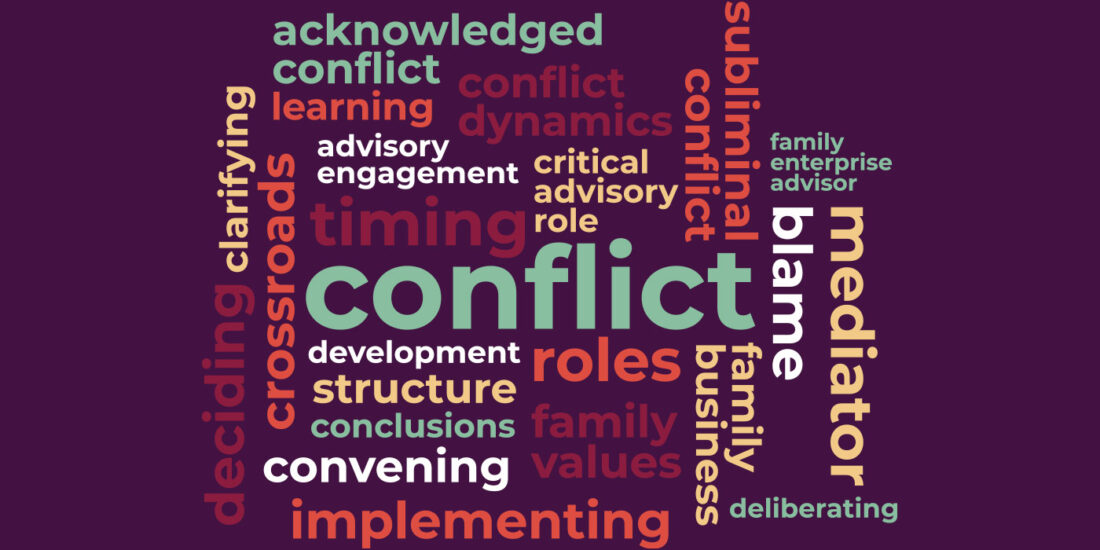Conflict is a part of life — and of family enterprises
Conflict is a broad and important topic. It’s an unavoidable part of life and of human interaction. Most of the time, any sort of focus – abstract or practical – is on negative conflict: how to prevent it or resolve it. Negative conflict can range in intensity from mere static to a full explosion. Ideally, the goal in conflict management should be to transform negative conflict to positive conflict. Positive conflict makes it possible to capture the creativity of all involved, to allow a clash of ideas that can lead to new and better ones.
Family enterprises provide especially good opportunities for conflict. First, the different systems that constitute the family enterprise must function effectively internally, as they relate to each other, and as they relate to the wider world (which includes you, the family business consultant.) Next, family enterprises typically value non-economic concerns far more than non-family enterprises that have a narrower focus on the bottom line. Priorities can include honoring legacy, preserving family harmony (often in a dysfunctional or ineffective manner), providing family employment.
Finally, and perhaps most importantly, family enterprises – by their very nature – are places where money and emotion interact. In my experience, the interaction of money and emotion is fertile ground for negative conflict. Almost any emotion will do just fine: pride, greed, jealousy, fear, and many others. When that emotion collides with money, explicitly or implicitly, the smallest spark can create conflict.
I recognize that I am in a tiny minority of people who are genuinely fascinated by conflict and actually enjoy working to help families and business manage conflict. Thus, this article is about a specific, practical perspective that all practitioners can use, even those who find conflict difficult to handle.
- Why does it matter that everyone has a chance to be heard?
Giving everyone an opportunity to speak enhances the consultant’s ability to get at the underlying problem, not just the symptoms of the problem. Clients, understandably, tend to focus on the manifestations of the problem – whatever is causing them pain. Moreover, the family can benefit for years to come if it embraces the concept of allowing everyone to be heard.
- Negatives of people not being heard
Secret decisions, suddenly announced decisions, and failure to make decisions can all do harm to the family enterprise. Just as nature abhors a vacuum, we want to assign a reason to decisions that are announced without apparent explanation or input. Those who are negatively affected by the decision tend to assign a negative motivation to it, even a highly implausible one.
The desire to be heard can be so strong that it overpowers other interests. Parties in litigation want to “tell it to the judge.” Although their attorneys may counsel them to agree to settle a case on favorable monetary terms, the need to be heard may be so intense that litigants feel they must continue – sometimes against their own best interests.
In reconciliation courts addressing past wrongs of a truly grievous nature, the ability to tell one’s story is uniquely powerful. There is no substitute for it. In more ordinary day-to-day encounters, we feel a lack of respect if we don’t have a chance to be heard. No one likes to be dismissed out of hand or ignored.
- Positives of people being heard
When people feel that they are being heard, they feel respected. They have an easier time accepting decisions that they disagree with. It allows people to say to themselves — and others — “well, I don’t like that decision, but at least I had a chance to say my piece.” Their buy-in and commitment to the decision will likely be greater than if they are unhappy about the substance of the decision itself and also resentful of the process that led to the decision. Commitment to the team is easier when you feel that you are a valued member of the team.
People who feel fully engaged in a process will have greater ability to make suggestions and voice ideas earlier, when a modest tweak may have a pronounced and positive impact. When a decision has been announced and presented as final, even a small adjustment may carry too high a cost to be implemented.
- Objections and responses to ensuring that people have a chance to be heard
If you are working with a family that has not had a habit of allowing people to be heard, you will undoubtedly encounter resistance – from those who can ensure that people can be heard and also from those who have felt ignored. Addressing those objections will help you work with the family to create a practice, a policy, and a system for allowing people to be heard. As you help the family create the specific structure that works for them, you can be sure that objections are considered. Here are a few likely objections and responses to them.
- We have never done it that way. That objection probably applies to any suggestion you make that requires change. In fact, some of the value you bring to the situation is your inevitable disruption of the existing system. Embrace your role as circuit breaker in a dysfunctional loop and emphasize that you are there to help the family enterprise adopt and implement some new approaches.
- It is not their decision to make. It is important to remember that allowing people to have a voice is not the same as giving them veto power or even giving them a vote. Allowing people to be heard does not necessarily mean a change in the formal decision-making mechanism.
- It will open the door to trouble. Acknowledge that it will be necessary to explain the parameters of allowing people to be heard, what the purpose is and what it is not.
- I don’t need any more input in the decisions I make. Encourage objectors to be open to the possibility that they have not considered every potential problem or solution.
- My door is always open. It may seem, from the point of view of the CEO or the patriarch (whether the same person or not), that it is obvious to all that input is welcome. An honest examination of how much input is offered may lead to a realization that others may have a different perception.
- More input will take too much time. As with most things, the short-term, on-the-cheap approach will take less time than a long-term, investment-in-the-family enterprise approach. Consider this input as an aspect of developing future leadership. Listening to a wide range of people allows current leadership to identify who may have been overlooked as potential future leaders, as well as to consider what support they, and those already identified, may need in order to grow professionally and personally.
- Why would I bother voicing my opinion; they won’t listen. If the prevailing practice has not been to ensure that people have a chance to be heard, it is to be expected that those who have tried and failed to speak may feel too defeated to try again. Your role as a consultant is two-fold. First, you will need to assure the previously silenced person that a change is underway. Second, you will need to help those in charge to create and implement a way to ensure that people will be heard. Keep in mind, however, that the idea is to create an opportunity to be heard, not a compulsion to speak out.
- I will have some kind of meeting, but only once. The idea is not to have a one-time grievance airing and venting session, after which everyone lives happily ever after. The idea is to create a new way of communicating that will become ingrained in the family enterprise and eventually feel like second nature. The outcomes will be worth the effort.
- I will go through the motions, but that’s all. Insincerity would create more problems than it solves. Just as an insincere apology can be inflammatory, simply pretending to act respectfully toward people – especially those with whom you share life in a family enterprise – can do lasting damage.
- OK, I see the value of doing this, but I don’t know how. Reassure the client that you will help. You will work together on the best, custom-fit solution for this family and its business. With practice, this new approach to communication will get better and easier.
Practitioners can use a wide range of tools and techniques in their service to family enterprises. Harnessing the power of being heard is one way to flip the conflict switch from negative to positive.
About the contributor
 Jane Beddall, MA, JD, CFBA, CFWA is founder and principal of Dovetail Resolutions, LLC in New Haven, CT. She has a special interest in helping families and their businesses manage conflict effectively. Jane can be reached at jb@dovetailresolutions.com.
Jane Beddall, MA, JD, CFBA, CFWA is founder and principal of Dovetail Resolutions, LLC in New Haven, CT. She has a special interest in helping families and their businesses manage conflict effectively. Jane can be reached at jb@dovetailresolutions.com.





